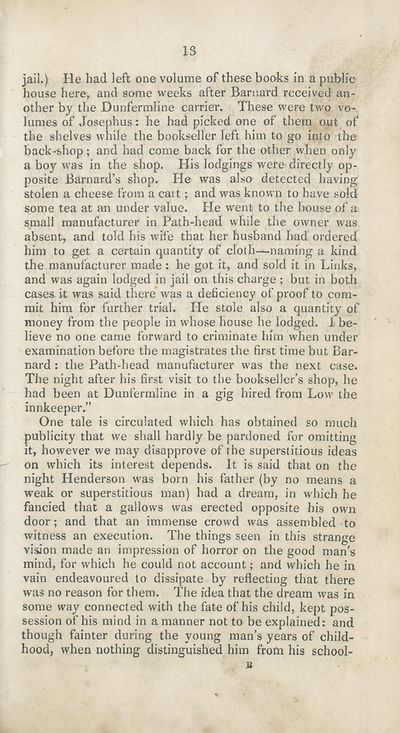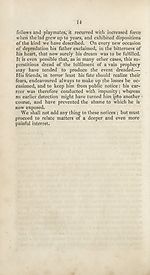Download files
Complete book:
Individual page:
Thumbnail gallery: Grid view | List view

13
jail.) He had left one volume of these books in a public
house here, and some weeks after Barnard received an¬
other by the Dunfermline carrier. These were two vo¬
lumes of Josephus: he had picked one of them out of
the shelves while the bookseller left him to go into the
back-shop; and had come back for the other when only
a boy was in the shop. His lodgings were directly op¬
posite Barnard’s shop. He was also detected having
stolen a cheese from a cai t; and was known to have sold
some tea at an under value. He went to the house of a
small manufacturer in Path-head while the owner was
absent, and told his wife that her husband had ordered
him to get a certain quantity of cloth—naming a kind
the manufacturer made : he got it, and sold it in Links,
and was again lodged in jail on this charge ; but in both
cases it was said there was a deficiency of proof to com¬
mit him for further trial. He stole also a quantity of
money from the people in whose house he lodged. 1 be¬
lieve no one came forward to criminate him when under
examination before the magistrates the first time but Bar¬
nard : the Path-head manufacturer was the next case.
The night after his first visit to the bookseller’s shop, he
had been at Dunfermline in a gig hired from Low the
innkeeper.”
One tale is circulated which has obtained so much
publicity that we shall hardly be pardoned for omitting
it, however we may disapprove of the superstitious ideas
on which its interest depends. It is said that on the
night Henderson was born his father (by no means a
weak or superstitious man) had a dream, in which he
fancied that a gallows was erected opposite his own
door; and that an immense crowd was assembled to
witness an execution. The things seen in this strange
vision made an impression of horror on the good man’s
mind, for which he could not account; and which he in
vain endeavoured to dissipate by reflecting that there
was no reason for them. The idea that the dream was in
some way connected with the fate of his child, kept pos¬
session of his mind in a manner not to be explained: and
though fainter during the young man’s years of child¬
hood, when nothing distinguished him from his school-
jail.) He had left one volume of these books in a public
house here, and some weeks after Barnard received an¬
other by the Dunfermline carrier. These were two vo¬
lumes of Josephus: he had picked one of them out of
the shelves while the bookseller left him to go into the
back-shop; and had come back for the other when only
a boy was in the shop. His lodgings were directly op¬
posite Barnard’s shop. He was also detected having
stolen a cheese from a cai t; and was known to have sold
some tea at an under value. He went to the house of a
small manufacturer in Path-head while the owner was
absent, and told his wife that her husband had ordered
him to get a certain quantity of cloth—naming a kind
the manufacturer made : he got it, and sold it in Links,
and was again lodged in jail on this charge ; but in both
cases it was said there was a deficiency of proof to com¬
mit him for further trial. He stole also a quantity of
money from the people in whose house he lodged. 1 be¬
lieve no one came forward to criminate him when under
examination before the magistrates the first time but Bar¬
nard : the Path-head manufacturer was the next case.
The night after his first visit to the bookseller’s shop, he
had been at Dunfermline in a gig hired from Low the
innkeeper.”
One tale is circulated which has obtained so much
publicity that we shall hardly be pardoned for omitting
it, however we may disapprove of the superstitious ideas
on which its interest depends. It is said that on the
night Henderson was born his father (by no means a
weak or superstitious man) had a dream, in which he
fancied that a gallows was erected opposite his own
door; and that an immense crowd was assembled to
witness an execution. The things seen in this strange
vision made an impression of horror on the good man’s
mind, for which he could not account; and which he in
vain endeavoured to dissipate by reflecting that there
was no reason for them. The idea that the dream was in
some way connected with the fate of his child, kept pos¬
session of his mind in a manner not to be explained: and
though fainter during the young man’s years of child¬
hood, when nothing distinguished him from his school-
Set display mode to:
![]() Universal Viewer |
Universal Viewer | ![]() Mirador |
Large image | Transcription
Mirador |
Large image | Transcription
| Antiquarian books of Scotland > Crime & punishment > Whinny Park murder > (27) |
|---|
| Permanent URL | https://digital.nls.uk/126150989 |
|---|
| Description | Thousands of printed books from the Antiquarian Books of Scotland collection which dates from 1641 to the 1980s. The collection consists of 14,800 books which were published in Scotland or have a Scottish connection, e.g. through the author, printer or owner. Subjects covered include sport, education, diseases, adventure, occupations, Jacobites, politics and religion. Among the 29 languages represented are English, Gaelic, Italian, French, Russian and Swedish. |
|---|

